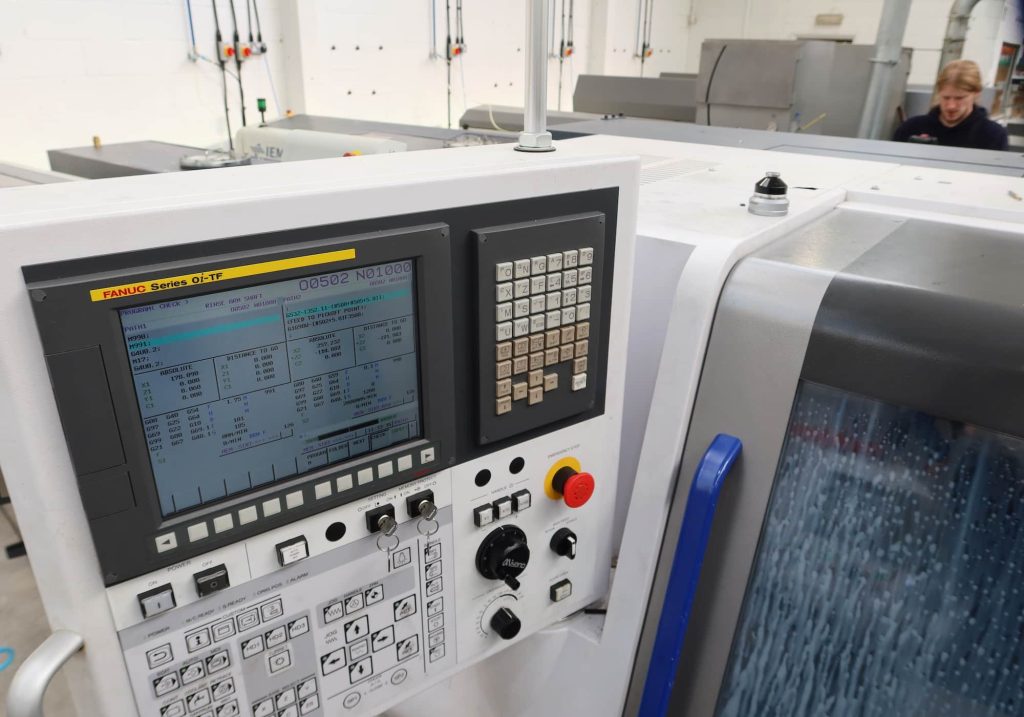Swiss and sliding head machining is a specialist form of CNC turning that delivers high precision, tight tolerances, and exceptional repeatability. This method is beneficial for producing small, complex components commonly found in sectors such as medical, aerospace, electronics, and automotive manufacturing. At Sheldon Precision, Swiss-style machining is one of our core capabilities, enabling us to meet even the most demanding specifications.

How Does Swiss and Sliding Head Machining Work?
The key difference between Swiss machining and conventional CNC turning lies in the manner in which the material is held and manipulated during the cutting process. In a Swiss-type lathe, the bar stock is fed through a sliding headstock and is supported very close to the cutting tool by a guide bushing. This design drastically reduces the deflection of the material, especially when working with long or thin components.
By allowing the tool to move in multiple axes while the material is fed through the machine, Swiss lathes can perform several operations in a single cycle. This not only improves efficiency but also ensures better surface finishes and tighter dimensional control.
What Are the Benefits of Swiss and Sliding Head Machining?
Swiss and sliding head lathes offer several advantages, especially for customers seeking high precision and consistent results. These include:
- Exceptional accuracy
With minimal material deflection and multiple-axis control, Swiss machines deliver consistently accurate parts. - Faster cycle times
Multiple tools can work simultaneously, and complex features can be machined in a single setup. - Improved surface finish
Swiss lathes provide a cleaner, smoother finish that often eliminates the need for secondary processes. - Greater efficiency for small, complex parts
Components that are difficult or costly to produce on traditional CNC machines are well-suited to Swiss machining. - Reduced waste and scrap
Tighter tolerances and greater control reduce the likelihood of defects, resulting in savings on both materials and time.
Which Materials Are Best for Swiss Machining?
Swiss and sliding head machining are highly versatile in terms of material compatibility. At Sheldon Precision, we commonly work with:
- Stainless steel
- Aluminium
- Titanium
- Brass
- Copper alloys
- Plastics (such as PEEK or Delrin)
This makes the process suitable for a wide range of applications, from corrosion-resistant medical devices to precision aerospace fasteners.
What Industries Use Swiss and Sliding Head Machining?
If your business demands high accuracy in miniature or complex components, Swiss machining could be the ideal solution. Here are some of the industries that regularly benefit from sliding head capabilities:
- Medical and dental
Bone screws, surgical instruments, dental implants and other critical parts. - Aerospace and defence
Lightweight, durable fasteners, connectors and control components. - Electronics
Miniature pins, housings and contacts for sensitive electronic assemblies. - Automotive
Precision fuel system parts, sensors, and custom fixings. - Industrial automation
High-performance parts for sensors, robotics and pneumatics.
What Tolerances Can Swiss Machining Achieve?
Swiss lathes are capable of maintaining extremely tight tolerances, often in the region of ±0.005 mm, depending on the part and material. This level of precision is crucial when parts must perform reliably under high stress, heat, or hygienic conditions.
At Sheldon Precision, we monitor quality throughout production and provide comprehensive documentation and traceability, ensuring that your parts meet both regulatory and functional standards.
When Should You Choose Swiss Machining Over Conventional CNC Turning?
Swiss machining is not always the default choice for all projects. However, it is often the best solution in the following cases:
- You need small or slender parts that could deflect under traditional turning
- You require complex, multi-featured geometries
- Your project demands tight tolerances and high volumes
- You want faster cycle times and lower per-part cost for high-precision components
Our team can assess your design and help you determine whether Swiss machining is the right fit or if a different method will deliver better efficiency or cost savings.
How Much Does Swiss and Sliding Head Machining Cost?
The cost depends on several factors, including part complexity, material, volume, and required tolerances. While Swiss machining can be more expensive for small batches or simpler geometries, the process becomes highly cost-effective at scale. That’s especially true when it helps reduce or eliminate secondary operations.
Sheldon Precision offers competitive pricing and can advise on design-for-manufacture principles to keep your costs as efficient as possible.
Swiss Machining with Sheldon Precision
We’ve invested in the latest Swiss-type sliding head lathes, and our engineers are specialists in high-precision manufacturing. Whether you’re developing a new product or seeking a reliable supplier for ongoing production, we bring decades of experience, transparent service, and a focus on quality that sets us apart.
Our capabilities include:
- Multi-axis sliding head lathes for complex geometries
- In-house tooling and prototyping
- Batch sizes from small runs to large-scale production
- ISO-certified quality control
- Rapid lead times and expert technical support
Use Our Expertise to Help with Your Swiss Machining Project
Swiss and sliding head machining offer unbeatable precision for parts that demand performance, accuracy and reliability. Whether you’re in aerospace, medical, electronics or beyond, Sheldon Precision is ready to help bring your project to life with high-performance components made to the tightest specifications.
Contact us today to discuss your requirements or to request a quote. Our team is always happy to advise on material selection, tolerances, and design optimisations that can make your manufacturing process smoother and more cost-effective.


